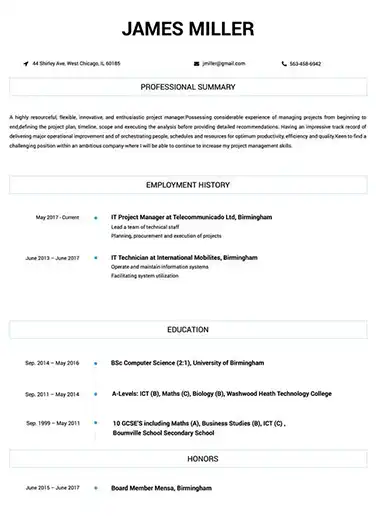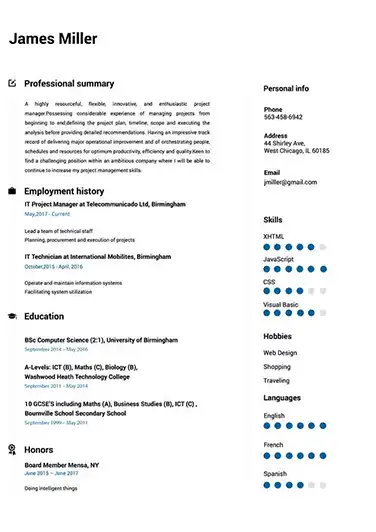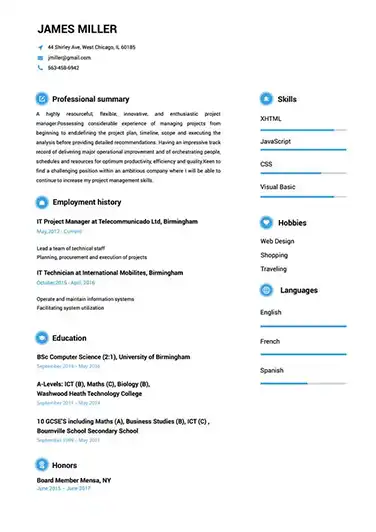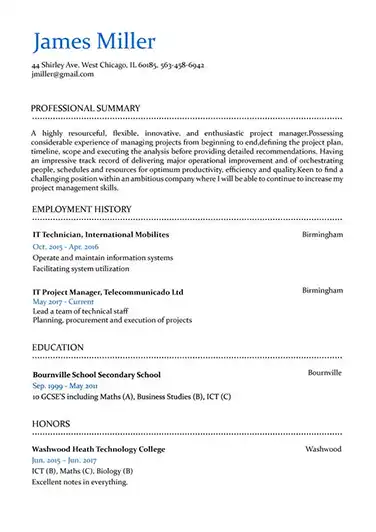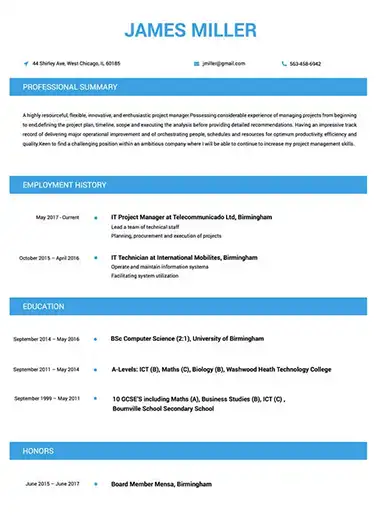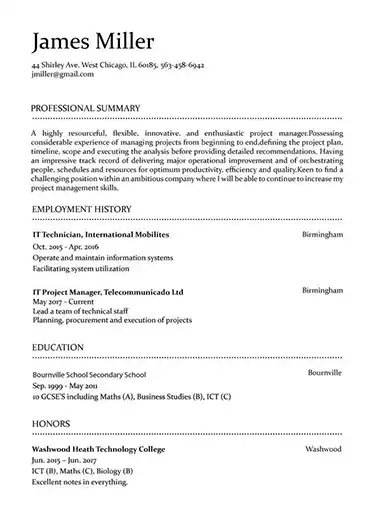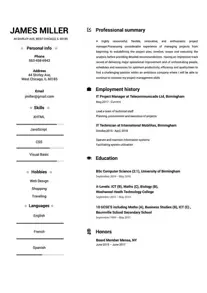 Use This Template
Use This Template
Build your resume in 15 minutes
Create an awesome resume that meets the expectations of potential employers with our selection of professional, field-tested resume templates.
pharmacist: Resume Samples & Writing Guide
carlsmith38@yahoo.com
780-505-8122
Employment history
- Review and interpret physicians' prescriptions
- Dispense medications and other medical products to patients
- Keep up-to-date records of medications and other medical products dispensed
- Advise patients on the selection, dosage, interactions, and side effects of medications
- Comply with state and federal regulations regarding the practice of pharmacy
- Perform other duties as assigned
- Compound and dispense medications as prescribed by physicians and other health practitioners
- Perform other duties as assigned
- Participate in continuing education programs and professional development activities
Education
Skills
Do you already have a resume? Use our PDF converter and edit your resume.
clarkandrew@inbox.com
988-198-3199
Employment history
- Ensure medication compliance and provide patient education
- Review and interpret physicians' prescriptions
- Comply with state and federal regulations regarding the practice of pharmacy
- Keep up-to-date records of medications and other medical products dispensed
- Maintain pharmacy inventory and place orders for medications and other supplies
- Compound and dispense medications as prescribed by physicians and other health practitioners
- Prepare insurance claim forms and provide other administrative support
- Monitor patient health and progress and report any adverse reactions to medications
- Advise patients on the selection, dosage, interactions, and side effects of medications
Education
Skills
millergeorge@yandex.com
826-555-6783
Employment history
- Keep up-to-date records of medications and other medical products dispensed
- Monitor drug therapies for drug interactions, allergies, and contraindications
- Ensure medication compliance and provide patient education
- Dispense medications and other medical products to patients
- Comply with state and federal regulations regarding the practice of pharmacy
- Advise patients on the selection, dosage, interactions, and side effects of medications
- Monitor patient health and progress and report any adverse reactions to medications
- Ensure medication compliance and provide patient education
- Counsel patients on drug therapies and monitor patient drug therapies for safety and efficacy
Education
Skills
pete-miller@gmail.com
610-856-5048
Employment history
- Keep up-to-date records of medications and other medical products dispensed
- Dispense medications and other medical products to patients
- Review and interpret physicians' prescriptions
- Maintain patient medication and allergy profiles
- Monitor patient health and progress and report any adverse reactions to medications
- Perform other duties as assigned
- Advise patients on the selection, dosage, interactions, and side effects of medications
- Maintain pharmacy inventory and place orders for medications and other supplies
- Counsel patients on drug therapies and monitor patient drug therapies for safety and efficacy
Education
Skills
waltersmith@mail.com
726-097-2962
Employment history
- Participate in continuing education programs and professional development activities
- Maintain patient medication and allergy profiles
- Compound and dispense medications as prescribed by physicians and other health practitioners
- Comply with state and federal regulations regarding the practice of pharmacy
- Prepare insurance claim forms and provide other administrative support
- Advise patients on the selection, dosage, interactions, and side effects of medications
- Dispense medications and other medical products to patients
- Perform other duties as assigned
- Review and interpret physicians' prescriptions
Education
Skills
Not in love with this template? Browse our full library of resume templates
Pharmacists are the bedrock upon which the entire medication industry is based. Without these highly trained individuals to verify prescriptions, keep track of stock, and ensure that prescriptions are filled the right way and in good time, we’d have no way to use the medication that doctors prescribe to us.
Working as a pharmacist is an exciting, hands-on position, but you need to make sure your resume is perfect in order to land your dream job. In the following guide we’ll be walking you through everything you need to know to craft a resume that’s sure to get you through the door. If you’ve been stressing out over how best to structure your resume, this article will serve as the perfect starting point for you, and can serve as a reference point for later resumes as well.
Multiple Template Examples
How to Write a Pharmacist Resume That Will Get You Through the Door
How to Format It
The best format for a pharmacist’s resume is the reverse chronological structure. The logic behind opting for this layout is based on recognizing just how important your college experience is. As a result, you should really be mentioning it as soon as possible in the document. The reverse chronological structure will also demonstrate your most recent working experience as a pharmacist right away, rather than spending precious time talking about less relevant jobs you may have held early on in your working career.
You have to think about the recruiter’s point of view when you’re planning out your resume. They may well be going through a massive pile of resumes, so it’s very possible that you’ll only have a limited chance to grab their attention before their mind starts to wander. The reverse chronological format is the ideal way to make as strong a first impression as possible.
What Makes a Great Pharmacist Resume
Great pharmacist resumes typically feature a few different key elements. These include:
- Relevant experience for the particular job you’re applying for
- The perfect blend of hard and soft skills for the job in question
- Any achievements you’ve managed to rack up over the years that are pertinent to the pharmaceutical industry
- Which aspects of your personality and working capacity you’re most proud of
- What makes you unique
However, it’s not enough to simply include the information mentioned above. In order to really blow the recruiter away and make it clear that you’re the right person for the job, you need to spare no energy in ensuring everything you include is formatted as clearly and attractively as possible. A good resume ticks all of the boxes above, whereas a great resume goes one step further and not only presents the above pieces of information, but also makes them easy to read and visually appealing.
Another way to elevate your resume from “good” to “great” is to make sure it’s specifically targeted to the particular job you’re applying for. We’ll be getting into targeting your resume for the job you’re applying to further on in this guide, but for the moment just keep in mind that every single line of your resume needs to be as accurate as possible in order to give yourself the best chance of impressing the recruiter.
How to Compose a Professional Experience Section in a Resume
Composing a professional experience section in a resume doesn’t need to take hours, but you do need to make sure you spend enough time on it to avoid any errors. There’s no point in having fantastic work experience littered with typos, spelling errors, and grammatical mistakes. The first key aspect to a great professional experience section is, therefore, doing your due diligence to ensure it’s spotless.
When you’re mentioning the jobs you’ve previously worked at, keep things as short and to-the-point as possible. We recommend including your job title, the name of the company you worked at, and the dates you started and finished working there. Underneath this quick overview, include a few bullet points that highlight your achievements — no more than four or five.
To really drive home the fact that you’re the best person for the job, craft your professional experiences section to the precise position you’re applying to. You’ll find more information on how to do that later on in this article, but the general idea is to pick out which traits the recruiters will be looking out for, and then tailoring your experiences to highlight why you’re the best choice for that particular job.
What Achievements to Mention and How to Do it Correctly
Mentioning achievements in your resume help paint a picture of yourself as somebody who doesn’t just stick to the status quo, but actively goes out of their way to succeed in everything you do. There are a few different categories of achievement to consider listing:
1. Clinical Achievements
By far the most impressive achievements you could mention on a pharmacist’s resume are those, which you accomplished in a clinical setting or during your residency. Throughout the course of your degree, you’ll, no doubt, have spent plenty of time getting practical work experience in the form of ward rounds, internships, etc.
Often there are special prizes awarded to students or technicians who perform exceptionally well, and if you’ve been able to snag one of these awards at some point during your training or clinical work, they should be the first achievements you mention in this section.
To get the most mileage out of your clinical achievements, keep the information about them short and sweet. A simple two-line description of what you accomplished and in what clinical setting you accomplished it is more than enough to impress the recruiter, and should give you a strong head start over your competition, who don’t have clinical achievements to mention.
2. Academic Achievements
Similar to clinical achievements, but not identical, academic achievements refer to any prizes you were able to win during your degree. These could include prizes awarded for essays, research work, or group projects you played an important part in. They don’t have to be directly related to pharmacy or pharmaceuticals. In fact, if you’re able to mention achievements that come from other fields, it will be especially impressive to whoever’s reading your resume, as it demonstrates that you’re a well-rounded candidate with a few different strings to your bow.
When you’re mentioning your academic achievements, it’s often a good idea to include a brief description, detailing exactly what the award entailed. For example, if you’ve won an essay prize, quickly going through what the prize was for and what your essay was about will help ground the achievement itself in a wider context, which means the recruiter is more likely to remember it — and, by extension, to remember you as well.
Which Soft Skills to Put In Your Resume as a Pharmacist
Because your day-to-day work as a pharmacist will involve a significant amount of time spent interacting with people, your soft skills are arguably more important than your hard skills. The kinds of traits that successful, high-achieving pharmacists have are almost all more closely related to interpersonal skills and high-level organizational abilities than they are to the more scientific side of the craft.
For that reason, it could be a good idea to mention your soft skills before the hard skills. Even though that seems to fly in the face of what’s usually recommended for writing resumes, in this specific instance it could be a great way to show the recruiter that you know what the job requires, and that you’re aware of which skills are likely to play the biggest roles in the daily routine. Here are some of the soft skills to mention in your resume:
- Communication and interpersonal skills
- Organizational ability
- Flexibility
- Teamwork
- Positive attitude
- Empathy
Which Hard Skills to Put In Your Resume as a Pharmacist
The hard skills that are used by pharmacists will relate to your ability to handle the more granular aspects of the job on a daily basis. For example, prior experience with prescription-tracking software, and being able to maintain neat and orderly inventory records will go a long way.
Although you won’t necessarily be using all of the biochemical knowledge you picked up during your degree on a regular basis, it’s still a good idea to talk about your familiarity with different kinds of prescriptions and medications. What’s particularly important is being able to quickly and accurately keep track of the way different medicines will interact with each other, so that you can advise a patient in real time, as opposed to having to spend an age trawling through the Internet to find the information you’re looking for. These are some of the most important hard skills to consider including on your resume:
- Maths & science skills
- Management ability
- Till operation
- Accuracy
- Familiarity with prescription-filling software
- In-depth knowledge of medication interaction
How to Write a Resume Objective and Examples of This
Your resume objective is a great opportunity to show the recruiter that you’ve read the job posting in detail and you understand exactly what’s required, but in order to make it truly impressive you need to understand how to write it correctly. Good resume objectives are written in a dispassionate, objective tone, focusing more on how you can get the job done, than on how well you were able to perform in past roles.
Take a close look at the job listing and work out which tasks are most important, and then craft your objective statement to reflect your ability to handle those tasks. Pharmacist resume objectives should be short and to the point — waffling on about the job is exactly the opposite of what you want to do, so don’t worry if you’re being too concise. Here are a couple examples of spot-on resume objectives that you can use for inspiration when you’re writing your own:
- Pharmacy graduate keen to apply knowledge of chemistry and interactions between different medications to that role at XYZ Pharmacy in order to improve patient health and on-location experience.
- Driven, passionate pharmacist with 5 years of experience interested in bringing customer service skills, interpersonal communication ability, and in-depth knowledge of medication and its dispensation to ABC Pharmacy.
How to Write a Resume Summary and Examples of This
Whereas resume objectives should be dry and to-the-point, resume summaries are an opportunity to present a much more holistic picture of what you can bring to the table, should you be hired for the job. Avoid the passive language used in writing a resume objective and instead focus on writing actively and dynamically, about the value you were able to bring to past roles.
Don’t be afraid to get specific in terms of numbers, percentages, or other hard figures that demonstrate concretely what a great idea it is to hire you for the role. See below for two examples of resume summaries that tick all the boxes, and pay special attention to how they differ from the examples of resume objective statements above:
- Energetic, empathetic pharmacist with 8 years of experience in all areas of retail pharmacy work interested in applying strong work ethic, excellent interpersonal skills, and organizational ability to that position at ABC Pharmacy. In my most recent professional experience I was able to make suggestions about medication arrangements in order to improve the customer experience, and I managed to increase footfall by 15% over the course of a year by reimagining the way the pharmacy was laid out.
- Organized, motivated pharmacist with two years of experience in retail pharmacy work interested in leveraging customer service skills and deep knowledge of medications in order to improve the customer experience and boost working efficiency at XYZ pharmacy. I handled a range of different jobs in my last professional engagement, including resolving insurance claim issues, training new personnel, and filling specialty prescriptions.
How to Write a Pharmacist Resume When You Have Limited or No Experience
Although having direct working experience in the role you’re applying for is obviously a big plus for employers, there’s no reason you can’t get without experience, as long as your resume is top notch. It can be a daunting task, attempting to write your resume in a way that focuses more on your skills and qualifications than prior professional experiences, but there are a few simple strategies you can follow in order to give yourself as much of a helping hand in the application process as possible. Here are some of the best ways to write a pharmacist resume when you have limited experience working as a pharmacist.
1. Get Specific With Your Skills
Whereas you might want to keep your skill section concise, if you already have on-the-job experience - if you’re fresh out of college and trying to land your first position, it’s a great idea to be as specific as possible when you’re talking about the skills you can bring to the table. Rather than simply sticking with general hard skills, as mentioned in the skills section above, don’t be afraid to be much more granular.
For example, instead of mentioning the fact that you have a wide array of clinical skills, talk about how you can count pills, operate the cash register, and quickly process possible interactions between medications in your head without needing to spend ages researching them online. Not only will this demonstrate that you’ve got the right skillset required to handle the demands of the role, it’ll also show that you got an intimate understanding of what day-to-day work of a pharmacist actually looks like.
2. Be Descriptive About Your Education
Everybody has to start somewhere, and pharmacists are no different. Because you’ve spent such a long time in college, working towards your degree, you already have an excellent supply of information you can call on, when you’re trying to distract from the fact that you don’t have much work experience.
Entry-level pharmaceutical jobs don’t always require candidates to have prior experience, and if you can talk expressively about how well you handled yourself throughout the course of an academic career, it just might tip the balance in your favor and encourage the recruiter to give you a start by going through with a hire for their entry-level position.
How to Target Your Resume for Each Application
Targeting your resume for a specific position is probably the single best way to boost your chances of getting called in for an interview. The single best way to ensure your resume is as targeted and precise as possible is by spending plenty of time reading over the job listing in detail and focusing on what exactly the recruiters are likely to be looking for.
Keywords are your friend in this endeavor. If you notice lots of keywords that relate to interpersonal skills and organizational ability, it makes sense to highlight that aspect of what you can offer in your resume. One way to prioritize those soft skills is by including them before the hard skills in your resume, which will make it immediately obvious to the recruiter that you’re not just copy-pasting your resume and using it for job after job, but rather tailoring your resume to the specific position you’re applying for.
Another way to make it clear you’ve read the listing and understand exactly what job you’re applying for is to customize your experience section, depending on what your potential employers are looking for. If, for example, they’re hoping for a hands-on, well-organized pharmacist to assist a more senior pharmacist in keeping everything neat and tidy, it may be a good idea to focus on experience you have working in a warehouse, or in stock at some retail position you have in your history.
This will encourage the recruiter to make a mental note about your application, because when they read your resume they’ll already be thinking that you offer exactly what they’re looking for in a new employee.
Pharmacist jobs are highly sought after, but if you’re able to put together a highly precise resume, you should be well on your way to snagging the position of your dreams. There’s plenty of upward mobility potential for pharmacists as well, with some of the most successful individuals going on to start their own pharmacies, so if you can get in at the ground level in an entry-level position, the chances for career advancement are high.
By targeting your resume as much as possible, you’ll be giving yourself the best possible chance of getting the job and stepping onto the first rung in that particular career ladder.
How to Make Your Resume Stand Out
Everybody wants to make their resume stand out, but by definition not everybody can stand out. To make sure your resume marks itself out from the herd, you need to do things that other candidates wouldn’t even consider. Because the degree and working experience is such an important aspect of being a pharmacist, the best way to stand out from the crowd might actually be to focus on other aspects of your resume.
It’s a given that your competitors will be focusing as much as possible on their experience and work history, which gives you a great opportunity, if you’re able to focus on the other, more commonly neglected aspects of your own application.
1. Make it Easy to Read
You’d be amazed at how many resumes make basic mistakes, such as being packed full of text, using more than one kind of font, or forgetting to leave white space. If you’re able to make your resume particularly easy to read, the recruiter will already be grateful, purely because they’re sick to death of reading awkward, clunky resumes that aren’t presented properly.
2. Focus on What Makes You Different
Everybody you’ll be competing with will have a pharmacist’s degree, but not everybody will have spent time in the debating society in college, just like not everybody will have gone on a charitable trip to South America. No matter what it is that you’ve been able to accomplish in your life, it’s worth mentioning, since it’ll help you to elevate your resume from a dry, formal document to a dynamic, versatile representation of a real person.
You’re the only one with your exact experiences, so whether it’s hobbies and interests, charitable work, or sporting excellence, talking about the things that only you can talk about will go a long way towards making your resume jump out at the recruiter and differentiate itself from the rest.
How Resumebuild.com’s Resume Building Tool Can Be Utilized for an Easy Resume Setup
The guide you’ve just read through probably seems like an awful lot of information, but don’t worry — there’s an easy, straightforward way for you to create a killer pharmacist’s resume, without needing to spend hours fine-tuning every last detail.
Resumebuild’s resume building tool comes already-equipped with hundreds upon hundreds of professionally-designed resume templates, every one of which will help you make your mark on the recruiter. All you need to do is choose the template that appeals the most to you and fill out the various personal details with your own information. Once you’re done with those two steps, the last stage is to download the resume itself, which only takes one click.
pharmacist Job Descriptions; Explained
If you're applying for an pharmacist position, it's important to tailor your resume to the specific job requirements in order to differentiate yourself from other candidates. Including accurate and relevant information that directly aligns with the job description can greatly increase your chances of securing an interview with potential employers.
When crafting your resume, be sure to use action verbs and a clear, concise format to highlight your relevant skills and experience. Remember, the job description is your first opportunity to make an impression on recruiters, so pay close attention to the details and make sure you're presenting yourself in the best possible light.
pharmacist
- Responsible for the day to day running of the Pharmacy.
- Providing a professional sympathetic and supportive service to patients and identifying the right healthcare solution to meet their needs.
- Accurately dispensing drugs to patients according to the doctor’s prescription.
- Measuring, packaging, labeling and recording medications issued to patients.
- Instructing patients on how to use medications, possible side effects and storage.
- Contacting and working closely with other healthcare professionals.
- Answering questions from patients and staff about medicines. Ensuring the accuracy of all prescriptions, products and services supplied.
pharmacist
- Order and purchase pharmaceutical supplies, medical supplies, or drugs, maintaining stock and storing and handling it properly.· Dispensed medications according to written prescriptions with 100% accuracy and 29% more efficiency than other senior level pharmacists
- Order and purchase pharmaceutical supplies, medical supplies, or drugs, maintaining stock and storing and handling it properly.
- Managing and resolving complaints.
- Talking to regular patients to see how their treatment is going.
pharmacist
- recruiting, training and managing staff
- processing prescriptions and dispensing medication
- ordering and selling medicines
- keeping statistical and financial records
- marketing services
- providing advice about health issues, symptoms and medications in response to customer inquiries.
pharmacist
- Responsible for dispensing and counselling
- Documentation of mandatory files like inventory,gap checks and Senior citizen Discounts
- Supervision of store as one of the highest store officer
- Ensuring all documents and the Pharmacy complies with the FDA requirements
- Stock balancing for medicine inventory
pharmacist
- Possess strong communication skills and consistently providing exceptional service.
- Provide information and advice regarding drug regimen, drug interactions, side effects, dosage, and proper medication storage.
- Ability to provide counselling on medicatons( eg. warfarin) and devices (eg. inhalers,insulin pens)
- Knowledge of handling psychotropic and dangerous drug distribution and disposal.
- Able to provide informations to the health care professionals on effectiveness of drugs or drug regimens, providing advice on drug applications or characteristics.
- Increased overall productivity by implementing processes that improved workflow and reduced errors.
pharmacist Job Skills
For an pharmacist position, your job skills are a key factor in demonstrating your value to the company and showing recruiters that you're the ight fit for the role. It's important to be specific when highlighting your skills and ensure that they are directly aligned with the job requirements, as this can greatly improve your chances of being hired. By showcasing your relevant skills and experience, you can make a compelling case for why you're the best candidate for the job.
How to include technical skills in your resume:
Technical skills are a set of specialized abilities and knowledge required to perform a particular job
effectively. Some examples of technical skills are data analysis, project management, software proficiency,
and programming languages, to name a few.
Add the technical skills that will get hired in your career
field with our simple-to-use resume builder. Select your desired resume template, once you reach the skills
section of the builder, manually write in the skill or simply click on "Add more skills". This will
automatically generate the best skills for your career field, choose your skill level, and hit "Save &
Next."
- Data Entry
- Medical Terminology
- Pharmacology
- Compounding
- Dispensing
- Drug Interactions
- Inventory Management
- Pharmaceutical Calculations
- Prescription Verification
- Pharmaceutical Law
- Quality Assurance
- Aseptic Technique
- Pharmacy Procedures
- Patient Education
- Pharmaceutical Compounding
- Drug Administration
- Sterile Compounding
- Pharmaceutical Compounding
- Drug Distribution
- Pharmacy Automation
- Clinical Pharmacy.
How to include soft skills in your resume:
Soft skills are non-technical skills that relate to how you work and that can be used in any job. Including
soft skills such as time management, creative thinking, teamwork, and conflict resolution demonstrate your
problem-solving abilities and show that you navigate challenges and changes in the workplace
efficiently.
Add competitive soft skills to make your resume stand-out to recruiters! Simply select
your preferred resume template in the skills section, enter the skills manually or use the "Add more skills"
option. Our resume builder will generate the most relevant soft skills for your career path. Choose your
proficiency level for each skill, and then click "Save & Next" to proceed to the next section.
- Communication
- Interpersonal
- Leadership
- Time Management
- Problem Solving
- Decision Making
- Critical Thinking
- Creativity
- Adaptability
- Teamwork
- Organization
- Planning
- Public Speaking
- Negotiation
- Conflict Resolution
- Research
- Analytical
- Attention to Detail
- Self-Motivation
- Stress Management
- Collaboration
- Coaching
- Mentoring
- Listening
- Networking
- Strategic Thinking
- Negotiation
- Emotional Intelligence
- Adaptability
- Flexibility
- Reliability
- Professionalism
- Computer Literacy
- Technical
- Data Analysis
- Project Management
- Customer Service
- Presentation
- Written Communication
- Social Media
- Troubleshooting
- Quality Assurance
- Collaboration
- Supervisory
- Risk Management
- Database Management
- Training
- Innovation
- Documentation
- Accounting
- Financial Management
- Visualization
- Reporting
- Business Acumen
- Process Improvement
- Documentation
- Relationship Management.
How to Improve Your pharmacist Resume
Navigating resume pitfalls can mean the difference between landing an interview or not. Missing job descriptions or unexplained work history gaps can cause recruiters to hesitate. Let's not even talk about the impact of bad grammar, and forgetting your contact info could leave your potential employer hanging. Aim to be comprehensive, concise, and accurate.
Employment history
- Maintain patient medication and allergy profiles
- Dispense medications and other medical products to patients
- Compound and dispense medications as prescribed by physicians and other health practitioners
- Dispense medications and other medical products to patients
- Participate in continuing education programs and professional development activities
- Prepare insurance claim forms and provide other administrative support
Education
Skills
Include your Contact Information and Job Descriptions
Missing job descriptions lessens your chances of getting hired.
Key Insights- Employers want to know what you've accomplished, so make sure to include descriptions for all of your previous jobs.
- Keep job descriptions short but don't just list your jobs.
- Never copy-paste a job description to post on your resume. Get inspired and use tools to help you write customized descriptions.
How to Optimize Your pharmacist Resume
Keep an eye out for these resume traps. Neglecting to detail your job roles or explain gaps in your career can lead to unnecessary doubts. Grammar blunders can reflect negatively on you, and without contact information, how can employers reach you? Be meticulous and complete.
jacksonlou@protonmail.com
757-098-4079
Employment history
- Prepair insurrance clame forms and proviede other administrativve support
- Kepp up-to-date records of medcations and other medcial products dispensed
- Ensure medciation complience and provide patinet education.
- Maintaine pharmacy inventroy, and place orders for mediciations and other supplys.
- Ensure mediacation complience, and provide patiant eduction.
- Prepare insurrance claim forms, and provide other adminstrative support.
- Comply with state and federal regulations regarding the practic of pharmacy
- Monitor drug therapies for drug interaction, allergys, and contraindications
- Prepare insurance claim forms and provide other administrativ support
Education
Skills
Correct Grammar and Address Gap Years in Your Resume
Don't leave unexplained gaps in your work history.
Key Insights- When explaining gaps in your employment section, start by being honest.
- Elaborate on the gap and show that you never stopped learning.
- Explain and elaborate any gap in your work history by highlighting new skills.
pharmacist Cover Letter Example
A cover letter can be a valuable addition to your job application when applying for an pharmacist position. Cover letters provide a concise summary of your qualifications, skills, and experience, also it also gives you an opportunity to explain why you're the best fit for the job. Crafting a cover letter that showcases your relevant experience and enthusiasm for the Accounts Payable role can significantly improve your chances of securing an interview.
Smith carlsmith38@yahoo.com
780-505-8122
530 Parkwood Drive, Citrus Hills, FL
34442
DaVita HealthCare Partners
Denver, Colorado
Dear Hiring Committee
I am writing to express my interest in the Chief Pharmacist role at DaVita HealthCare Partners. As a Pharmacist with 8 years of experience in Healthcare & Pharmacy, I am confident that I have the necessary skills and expertise to succeed in this position.
My diverse life experiences have taught me the importance of adaptability, creativity, and resilience. Whether it was on the job, or simply on my day to day, I have learned to navigate challenges and find innovative solutions. I am confident that I possess the skills and expertise necessary to excel in the position at DaVita HealthCare Partners and I am excited about the opportunity to grow with a team that values these qualities and contribute to your organization's growth and success.
Thank you for considering my application for the Chief Pharmacist position. I hope you will allow me to show you what I am capable of bringing to your organization and how we can work together to make an impact on the industry.
Looking forward to hearing from you,
Carl Smith
780-505-8122
carlsmith38@yahoo.com
Carl Smith
Showcase your most significant accomplishments and qualifications with this cover
letter.
Personalize this cover letter in just few minutes with our user-friendly tool!
Related Resumes & Cover Letters

Build your Resume in 15 minutes
Create an awesome resume that meets the expectations of potential employers with our selection of professional, field-tested resume templates.

